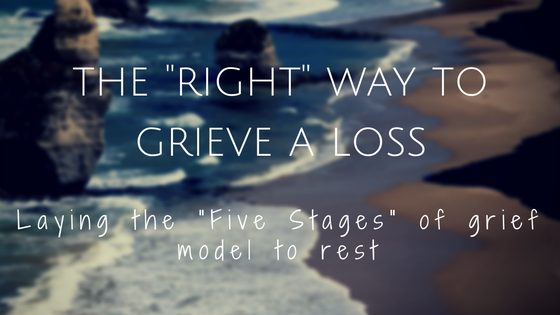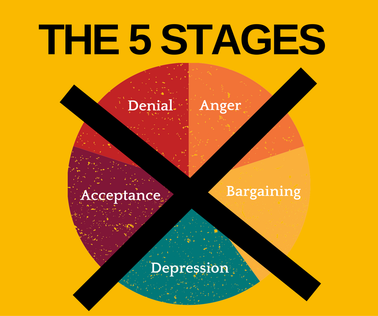|
Dr. Hannah Singer Denial - Anger - Bargaining - Depression - Acceptance. These so-called 5 stages of grief are widely recognized and accepted as the path mourners must go through in order to finally “move on” and “get over” the death of a loved one. But it’s time to say goodbye to this inaccurate and unhelpful road map of the grief process. Decades of research have debunked this popular model of grief. The majority of people do not go through these 5 stages, and if they do, it’s not necessarily in that order. The Five Stages model creates expectations about what is “normal”. It implies that there is a right way and wrong way to grieve - anyone who is not progressing through the correct stages is said to be “not handling it well”. Or perhaps just “still in denial”..... READ MORE The Five Stage Model also suggests that grief is a linear process with an ending point at acceptance. In reality, grief is often a messy and bumpy road with periods of calm interrupted with what many refer to as “grief attacks”. And acceptance is a continuous process, not a one-time event. You don’t just get to acceptance and then poof- your grief is done. You may dip in and out of acceptance. You may never accept the reality of the loss. That doesn’t mean that you’re destined to a life stuck in the denial, anger, and depression stages. A different approachAs a psychologist and psychotherapist, I spend a lot of time up close and personal with grief. I’ve run grief and loss support groups. I’ve worked with grievers in individual therapy. In my personal life, I’ve grieved the deaths of loved ones and have been there as friends and family have grieved their own losses. I also spent 3 years researching and writing my 200-page doctoral dissertation about factors that impact the grieving process. Through these personal and professional experiences with the grieving process, I have come to the following understanding of the grief process. THERE IS NO "RIGHT" WAY TO GRIEVE. Every single person will grieve differently depending on a thousand different factors (which explains why my dissertation was 200 pages….). Yes - there are social and cultural norms about how you “should” feel or behave following a loss. My best advice is to throw these expectations out the window. Allow yourself to write your own rule book when it comes to your grief. Feel whatever it is you are feeling - confusion, anger, sadness, guilt, relief, happiness, or maybe all of the above at the same time. You may feel relief at one moment and sadness the next. You may be completely numb for 2 months and then happy for 2 weeks and then suddenly start screaming at your DVR because it cut off the last 2 minutes of your favorite show. It’s all how you are “supposed” to feel because there is no “supposed” to when it comes to grief. You are allowed to cry in your car on your lunch break. You are also allowed to never shed one single tear. You are allowed to be angry at the person who died. You are allowed to be angry at God. You are allowed to be angry at the people who do not have to experience the pain you are currently experiencing. You are allowed to not be feeling any pain at all. It’s okay to visit the gravesite every day. It’s also okay to never visit the gravesite. You’re not crazy if you have daily imaginary conversations with the person who died. You’re not crazy if you still set a place for the person at the dinner table every night. You don’t ever need to “move on” or “accept” or explain yourself to anyone. It’s all okay. It’s all the “right” way to grieve because it’s YOUR way! 5 "Rules" For GrievingThese are the only rules I'll ever suggest following:
I wish you comfort on your journey through grief. I'll leave you with one of my favorite quotes on grief and loss. Feel free to share one of your favorites in the comment section below. Grief is not a disorder, a disease or a sign of weakness. It is an emotional, physical and spiritual necessity, the price you pay for love. The only cure for grief is to grieve. -Earl Grollman
2 Comments
Judy Solomon
10/14/2016 02:19:45 pm
I thought this was so informative and helpful and well written. Thank you so much!
Reply
Laura Portney
10/19/2016 11:01:42 am
I couldn't love this more! I also lead grief support groups and everything you write is spot on!
Reply
Your comment will be posted after it is approved.
Leave a Reply. |
About.I'm a clinical psychologist and adult psychotherapist based in Los Angeles. I specialize in treating anxiety, trauma, and perinatal mental health using traditional talk therapy, mindfulness-based therapy, and EMDR. Stay postedCategories
All
Archives
March 2020
|



 RSS Feed
RSS Feed